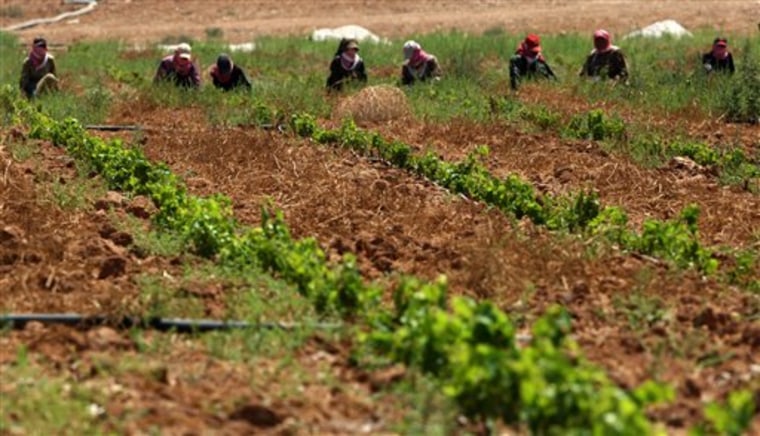Omar Zumot goes to extremes when making his organic wine. Specially cultivated sheep slurp the dry leaves off the vines, their saliva serving as an anti-bacterial, while fish from a nearby pond produce nitrates to fertilize this northern vineyard.
But Zumot's efforts are translating into international awards — five in recent months for his St. George brand.
In a region where the majority Muslim population frowns on alcohol, a new generation of vintners in Jordan, Israel, Lebanon and Syria is emerging and trying to make a splash on the world wine market, experimenting with different grape varieties and techniques.
"I think there's going to be a revival called 'New Old World' wines," Said Sawalha, a connoisseur who heads the Jordanian chapters of several international epicurean organizations, said in a play on the 'New World' wines from the U.S., Australia and Chile that leaped onto the international scene in past decades.
Lebanon, with its large Christian community and colonial links to France, is one of the few Arab countries that has long had a significant wine industry. But only one, Chateau Musar, has ever broken into the international market.
The 1975-1990 civil war hindered the industry's growth, laments Lebanese wine expert Michael Karam. Lebanon was "mired in conflict when the 'New World' wine explosion began."
Now the numbers of producers are swelling — 33, compared to the 15 that Karam counted in his 2004 book "Wines of Lebanon. The country's winemakers association is more aggressively targeting international buyers, hiring a public relations firm to promote their products in Britain.
"If you ask an average person on the street, they still associate Lebanon with hostages and war. There's really very little knowledge," said Madeleine Waters, the Coco PR executive who runs the campaign.
Still, newer Lebanese vintners Massaya, Clos St. Thomas, Domaine des Tourelles and Coteaux de Botrys can only go the boutique route, Karam said. Lebanon produces only up to 7 million bottles, with half exported.
Critic Mark Squires believes that Lebanon still has to prove it has an international-level industry.
"Let's get beyond the Musar stage," he said. While some top wineries, such as Massaya, have international connections, they are still "relatively obscure" in the U.S. market and are viewed as a "curiosity," he said.
Neighboring Syria has its own potential. One upcoming vintner to watch is Syria's Bargylus, run by the Syrian-Lebanese Saade family, Karam said. Syria's wine industry is "primitive," but Bargylus sets a standard as a "truly stunning wine of international quality," he said.
Israel's experience is far broader. Its first mass-market wines came after Baron Edmond de Rothschild sent varieties from Bordeaux in the late 19th century. Its modern industry came of age in the 1980s with California technology, Israeli high-tech farming and adventurous winemakers.
New wineries and boutique vineyards have boosted investment and brought in new plantings of Cabernet Sauvignon, Chardonnay and Merlot to the cool Upper Galilee and the Golan Heights, the country's best growing areas — though the Golan is disputed with Syria, from which Israel captured it in the 1967.
Newer wines produced by Clos de Gat, Yatir, Binyamina, Margalit and Domaine du Castel are the ones to now watch, said Daniel Rogov, Israel's most influential wine critic.
Israel produces 33 million bottles annually, much of it kosher, with more than $22 million worth exported last year. Some 14 Israeli wines have received awards from "The Wine Advocate" critic Robert Parker.
But Squires, who is Parker's Mideast specialist, said there's still "room for growth and improvement" — most notably, he said, the kosher label deters some.
Winemaking in much of the Middle East has been stunted in part by low demand — and sometimes outright opposition — among the largely Muslim population, since Islam forbids alcohol. Jordan's Muslim Brotherhood, which holds considerable sway among conservatives, opposes wine production, though their objections have been low-key and have not derailed efforts.
Jordan's first wines, made by table grapes grown in the country, were notoriously of the "Chateau Migraine" quality.
Zumot said that when he began his vineyard 14 years ago, "people laughed when we took grapes from Europe to grow near the deserts of Jordan, but it worked." Zumot introduced 34 noble varietals, defying European advice by experimenting to see what worked.
He produces 17 whites, roses and reds from his northern vineyard near the Syrian border. As an organic grower, he does not use pesticides or chemicals. One alternative he has found is his sheep: About two months after harvest, he lets them graze on the leaves, which he says leaves nothing for pests to lay their eggs in and, with the sheep's saliva, sterilizes the trunks.
His Gewurztraminer won a silver medal, beating out 15,000 other whites at the 2009 Vinalies Internationales, organized by the French Winemakers Union. The same group awarded his Chenin Blanc and Merlot silver medals this year. St. George Shiraz and Shiraz Reserve won bronze medals at the 2009 Japan Wine Challenge.
Zumot is producing just 300,000 bottles a year, most consumed locally, exporting less than 1 percent to neighbors. He hopes, however, to ramp up production and exports.
"The vine and grapes develop here in a manner we are not used to in Europe. They're phenomenal," said Guido Romero, an Italian expert knowledgeable about modern Mideast wines.
"Zumot's wine has real structure. If tasted, it will make a mark."
